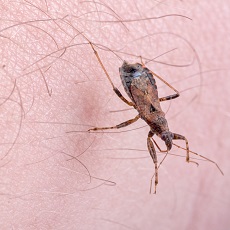Chagas Disease

Summary
Chagas disease is caused by a parasite. It is common in Latin America but not in the United States. Infected blood-sucking bugs, sometimes called kissing bugs, spread it. When the bug bites you, usually on your face, it leaves behind infected waste. You can get the infection if you rub it in your eyes or nose, the bite wound or a cut. The disease can also spread through contaminated food, a blood transfusion, a donated organ or from mother to baby during pregnancy.
If you notice symptoms, they might include
- Fever
- Flu-like symptoms
- A rash
- A swollen eyelid
These early symptoms usually go away. However, if you don't treat the infection, it stays in your body. Later, it can cause serious intestinal and heart problems.
A physical exam and blood tests can diagnose it. You may also need tests to see whether the disease has affected your intestines and heart.
Medicines can kill the parasite, especially early on. You can also treat related problems. For example, a pacemaker helps with certain heart complications.
There are no vaccines or medicines to prevent Chagas disease. If you travel to areas where it occurs, you are at higher risk if you sleep outdoors or in poor housing conditions. It is important to use insecticides to prevent bites, and practice food safety.
Centers for Disease Control and Prevention
Learn More
- American Trypanosomiasis (Also Known as Chagas Disease) Blood Screening FAQs (Centers for Disease Control and Prevention) Also in Spanish
- American Trypanosomiasis (Also Known as Chagas Disease) Detailed FAQs (Centers for Disease Control and Prevention)
- American Trypanosomiasis (Also Known as Chagas Disease) Diagnosis (Centers for Disease Control and Prevention) Also in Spanish
- American Trypanosomiasis (Also Known as Chagas Disease) Treatment (Centers for Disease Control and Prevention) Also in Spanish
- American Trypanosomiasis (Also Known as Chagas Disease) Triatomine Bug FAQs (Centers for Disease Control and Prevention)
- Chagas Disease (American trypanosomiasis) (World Health Organization) Also in Spanish
- Diagnosis of Parasitic Diseases (Centers for Disease Control and Prevention) Also in Spanish
- Travelers' Health: Trypanosomiasis, American (Chagas Disease) (Centers for Disease Control and Prevention)
Clinical Trials
-
ClinicalTrials.gov: Chagas Disease
 (National Institutes of Health)
(National Institutes of Health)
Journal Articles References and abstracts from MEDLINE/PubMed (National Library of Medicine)
Patient Handouts
- Chagas disease (Medical Encyclopedia) Also in Spanish
- Chagas Disease (Centers for Disease Control and Prevention) - PDF
